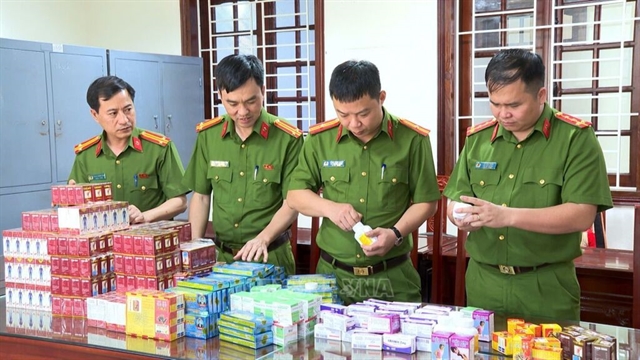 Society
Society

 |
| Counterfeit medicines seized by the police in Thanh Hóa Province during an operation in April 2025. — VNA/VNS Photo |
HÀ NỘI — Deputy Minister of Health Đỗ Xuân Tuyên has told lawmakers that Việt Nam’s rate of substandard and counterfeit medicines is lower than the global average, though retail outlets and online platforms remain key sources of concern.
He made the remark while presenting a report at a National Assembly hearing on counterfeit medicines and food on August 21.
Tuyên emphasised that while counterfeit drugs have not been found in hospitals or clinics in recent years, inspectors continue to detect them in retail and e-commerce channels.
Between January 2024 and June 2025, the ministry's inspectors tested nearly 34,000 medicine samples, finding that 0.45 per cent failed to meet quality standards. This is far lower than the World Health Organization's 2017 estimate of 10 per cent for low- and middle-income countries.
Nationwide, more than 600,000 facilities were inspected, nearly 10,000 violations were identified, and fines reached over VNĐ51 billion (US$1.9 million).
Counterfeit dietary supplements are another pressing problem. Investigations exposed several cases of falsified products, including Kera vegetable candy and fake milk produced by Rance Pharma JSC and Hacofood Group JSC.
The Ministry of Industry and Trade also reported intensified action.
From January 2024 to June 2025, market surveillance forces handled 11,610 violations involving counterfeit food, imposing fines of VNĐ76.4 billion ($2.9 million).
They also dealt with 345 cases related to pharmaceuticals and dietary supplements, with fines exceeding VNĐ29 billion ($1.1 million) and confiscated goods valued at more than VNĐ14 billion ($530,000).
Deputy Minister of Industry and Trade Nguyễn Sinh Nhật Tân said the ministry has strengthened its coordination with other enforcement agencies and transferred a number of criminal cases to police.
Local industry and trade departments have also worked with ministries to develop new standards and technical regulations for high-risk food categories.
Despite progress, deputies said loopholes in regulation and enforcement persist. Concerns focus on lax oversight of advertising, ineffective use of anti-counterfeit stamps and QR codes, and overlapping responsibilities between ministries.
Minister of Health Đào Hồng Lan admitted shortcomings, including the absence of mechanisms to suspend product registrations when violations are detected, and a lack of legal provisions to revoke certificates.
She also pointed to inconsistencies in the definition of 'counterfeit food' across different laws, which complicates enforcement.
Lan noted that some businesses exploit the self-declaration mechanism for functional foods to exaggerate product benefits or market them as medicines.
The ministry has instructed local authorities to tighten product classification and prevent abuse of the self-declaration system, she said.
The health minister also underlined staffing shortages, particularly at the grassroots level. At present, commune-level governments rely on cultural and social divisions as well as local health stations to manage drug and food safety.
To address the shortfall, the ministry is implementing a plan to send 1,000 doctors to commune health stations. Under a Politburo directive, each commune is expected to have three to five doctors in future, including some trained in pharmaceuticals.
On the issue of non-prescription drug sales, Lan stressed that regulations are already in place and that local authorities bear a "very large responsibility" for enforcing them.
Nguyễn Đắc Vinh, Chairman of the National Assembly’s Committee on Culture and Society, said the session’s feedback would inform the committee’s final resolution.
He emphasised that counterfeit medicines and food are not only a national issue, but also a global challenge that damages public health, undermines consumer confidence and threatens social stability.
Vice Chairwoman Nguyễn Thị Thanh called counterfeit products a long-term hazard that erodes trust, harms businesses, and endangers lives.
She reaffirmed the Party and State’s zero-tolerance approach, urging ministries to "go straight to the heart of the matter," clarify responsibilities and propose practical, enforceable solutions.
Deputy Minister Tuyên said Việt Nam has reduced the rate of counterfeit and substandard medicines from over 10 per cent in the early 1990s to below 2 per cent in the past few years.
But he cautioned that counterfeit networks remain active, increasingly exploiting e-commerce and social media to reach consumers drawn by low prices and the ability to self-medicate. — VNS




